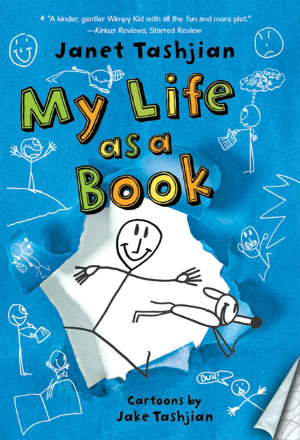Cartoons by Jake Tashjian
(Henry Holt and Company, 2010)
 The cover of this middle grade novel immediately conjured up
Diary of a Wimpy Kid and that is
exactly what the publisher is striving for, as the back cover includes a quote
favorably comparing the two. Just like
many hoping to expand boys’ reading repertoires, I bought a copy but let it sit
in a drawer for over a year, feeling stupid for falling for the gimmick.
The cover of this middle grade novel immediately conjured up
Diary of a Wimpy Kid and that is
exactly what the publisher is striving for, as the back cover includes a quote
favorably comparing the two. Just like
many hoping to expand boys’ reading repertoires, I bought a copy but let it sit
in a drawer for over a year, feeling stupid for falling for the gimmick.
Summer is a great time, however, for frivolous reading. Turns out that My Life as a Book is better than I’d expected. Author Janet Tashjian and I have the same
agenda. She too wants to motivate boys
to take up reading in the middle years and sheds light on the issue through
main character Derek Fallon, a struggling reader who doesn’t want to read. (How many of us leap into doing things that
are a clear struggle? I have yet to hook
up the cords from my new cable box to the TV downstairs.)
The story opens with Derek looking forward to summer, a time
for being a nuisance at the local mall, having “grenade” fights with ripened
avocadoes and staring up at clouds with his dog Bodi by his side. But reading threatens to ruin
everything.
The first sentence of the book sets the tone: “I DON’T WANT TO READ THIS BOOK!” It is Derek’s reaction to a library find his
mother imposes on him. I wonder how many
boys will respond to this book with the same sentiment. (Imagine the mind trip. Hey! The author just read my mind!) Derek’s desperate mother tries to bribe
him with a chocolate chip for each page read and quickly doubles her offer. As if reluctant readers can be trained like
seals. Derek temporarily escapes the
reading push by climbing onto the roof and seeking refuge in the attic.
The freedom of summer is further mucked up by his
teacher. She doesn’t just dismiss the
class with “Have a good summer. Wear
sunscreen!” No, she hands each student a
required reading list. Three books! With reports!! As anyone who is “reluctant” about something,
Derek keeps putting off the reading.
This leaves the assignment hanging over his head for his entire
vacation.
Fortunately, there are plenty of distractions. Most intriguing comes from Derek’s attic retreat. Tashjian is quick to stir the plot. On page 3, Derek discovers a ten-year-old
newspaper article: “LOCAL GIRL FOUND
DEAD ON BEACH.” The Fallons live in L.A.
and the article is from a Martha’s Vineyard paper. Intrigue!
His mother’s attempts to dismiss the article only make Derek more
determined to dig deeper. Turns out his
family is indeed personally connected to the story.
The story is an easy read.
The margins include quick sketches drawn by the author’s son, Jake. They are intended to emulate the reading
strategy Derek’s reading tutor imposes—creating drawings for new vocabulary to
strengthen comprehension. Perhaps it’s
because I am an adult, but I found the drawings distracting. The illustrated words are often not
particularly complicated (e.g., mustache, flattened). I get the feeling some of the words are
featured just because the page needs a drawing.
Indeed some of the illustrations don’t prove helpful; rather, they may
only add confusion.
Older readers (i.e., adults) may not like Derek’s character
as he comes off a bit snarky, but I think the target audience will relate. My problem is the boy’s age. He acts far too young to be twelve, even with
impulse control issues. All through the
book, I pictured Derek as a fourth grader.
Many parents will relate to the desperate negotiating
tactics Mrs. Fallon tries in order to entice her son to read. At one point, she even attempts to create
excitement by putting a required reading book in an empty pizza box. That’s bound to backfire and create some
serious pepperoni madness. But there are
some practical nuggets for struggling readers, too. In addition to the vocab draw strategy, one
of the Learning Camp leaders—yes, summer fun is further squelched—teaches Derek
to visualize while reading. “Just
picture every paragraph like a scene in a movie. Close your eyes and see the character act out
the story in your mind.” Good
advice. Sadly, this doesn’t come
naturally to all readers. Imagine then
what happens to reading when the more mature books reduce or do away with
illustrations.
This book is intended for both young and old(er)
readers. The young will enjoy the plot
and muse over Derek’s impulsive ideas.
Teachers, librarians and parents may see themselves in the novel and gain
insights into what to do and what not to do in trying to creating a reading
spark among some of the most resistant.
My Life as a Book should
have a long shelf life.

No comments:
Post a Comment